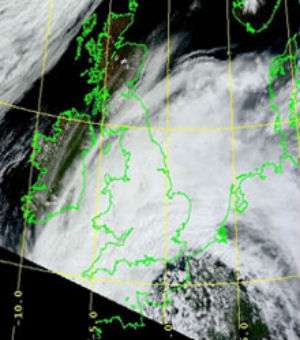Climate study explores link between Arctic warming and extreme weather

Scientists have begun work on a major new study to explore how the warming Arctic climate could be influencing the weather in Britain and beyond.
The new EU-financed project, involving climate scientists from the University of Reading, will help to improve weather and climate prediction in the face of a rapidly changing Arctic.
Known as APPLICATE (Advanced Prediction in Polar regions and beyond: modelling, observing system design and LInkages associated with a Changing Arctic climaTE), the €8 million project, financed by the EU HORIZON 2020 Research and Innovation programme, involves 16 partners from nine countries (Belgium, France, Germany, Iceland, Norway, Russia, Spain, Sweden and the United Kingdom) and will be carried out over a period of four years.
As well as scientists at the University of Reading, other UK partners include the European Centre for Medium-Range Weather Forecasts, also based in Reading, and the Met Office.
The multinational and multidisciplinary consortium will work to enhance weather and climate prediction capabilities not only in the Arctic, but also in Europe, Asia, and North America.
Dr Len Shaffrey, from NCAS at the University of Reading, said: "There's increasing evidence that warming in the Arctic caused by climate change could be having an impact on the weather of Britain and beyond.
"If we can better understand how this process works, we'll be able to provide more accurate predictions of extreme weather, such as extended periods of cold or heavy rain."
Warming Arctic Could Lead to Colder Britain
A focus on the Arctic is important for improved predictions of weather and climate in the mid-latitudes because the changes taking place in the Arctic due to climate change-the retreat of sea ice, warming seas and a warming atmosphere-have the potential to influence weather and climate in the mid-latitudes.
According to several studies (the most recent of which was published in Nature Climate Change in October 2016), a warming Arctic can, in fact, lead to prolonged periods of severe weather and cold spells in the mid-latitudes.
The impacts of severe weather on commerce and infrastructure can be significant, so having adequate tools to predict when and how severe weather systems will affect Europe, Asia and North America is vital to inhabitants of these regions. The APPLICATE project is bringing together an international team of experts in weather and climate prediction to improve climate and weather forecasting models to work on improving prediction tools while expanding and improving observational capabilities in the Arctic.
"In the Arctic, today's prediction systems suffer from a lack of observations, model shortcomings and deficits in effectively combining models with observations," according to APPLICATE Project Coordinator Prof Thomas Jung, climate scientist at the Alfred Wegener Institute Helmholtz Centre for Polar and Marine Research, the lead partner in the project.
"Our aim is to design a future Arctic observing system that enhances our predictive capacity. Additionally, the representation of critical processes in models will be improved and new ways of assimilating observations into models will be explored."
Journal information: Nature Climate Change
Provided by University of Reading



















